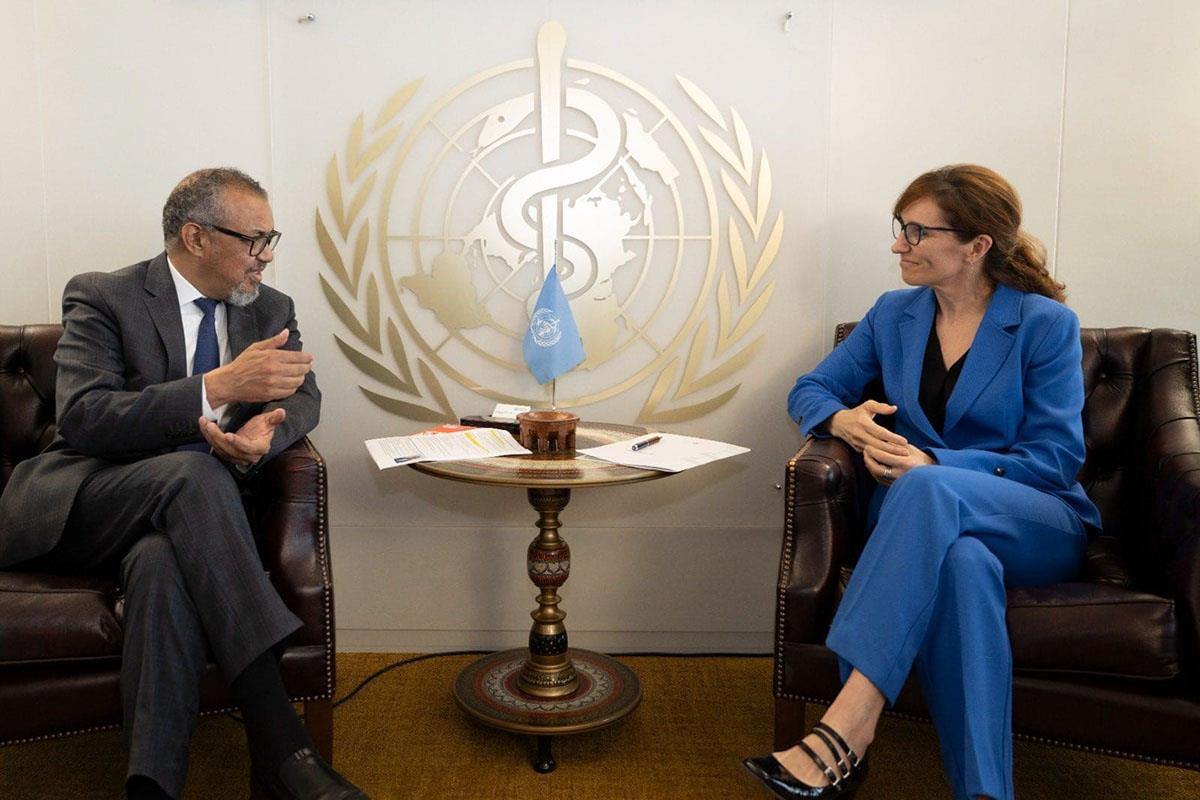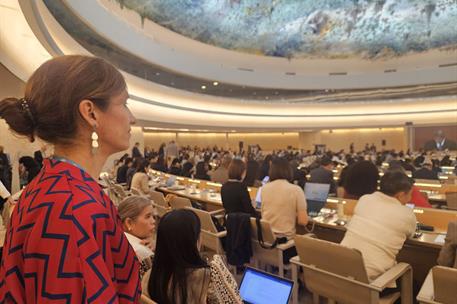 Meeting between the Minister for Health, Mónica García, and the Director-General of the World Health Organization (WHO), Tedros Adhanom Ghebreyesus
Meeting between the Minister for Health, Mónica García, and the Director-General of the World Health Organization (WHO), Tedros Adhanom Ghebreyesus
The Government of Spain has approved the new Spanish Global Health Strategy 2025-2030 promoted by the Ministries of Foreign Affairs, European Union and Cooperation and Health. This is a roadmap with which Spain reinforces its international commitment to improve global health from an inclusive, sustainable and human rights-based approach.
In the words of the Minister for Foreign Affairs, José Manuel Albares, "Spain is reaffirming its commitment to global health through responsible and supportive leadership, promoting a strategy based on equity, human rights and multilateral cooperation". In addition, the strategy addresses new challenges such as health emergencies, climate change or access to innovation, sets new objectives and contributes to the coordination and cooperation of all institutional actors involved. "We want to contribute to a world where health is a right and not a privilege, by strengthening resilient health systems focused on primary care," says the Minister for Health, Monica Garcia.
The Government of Spain has adopted this Strategy with the aim of strengthening international cooperation in health and collaborating in the construction of a system of global health governance that will make it possible to respond to the main health challenges we will face in the coming years. In addition, it addresses challenges such as health emergencies, climate change or access to innovation, sets new objectives and contributes to the coordination and cooperation of all institutional actors involved.
The Spanish Global Health Strategy was born in a context marked by the lessons learned from the COVID-19 pandemic, the climate crisis, rising inequalities and threats to multilateral governance. With it, Spain becomes the fifth country in the European Union to adopt a specific strategy on global health, aligned with the 2030 Agenda for Sustainable Development and the principles of equity, social justice, sustainability and international cooperation.
Spain maintains strong support for the World Health Organisation, a fundamental pillar of the global health system, and for key initiatives such as the Global Fund to Fight AIDS, Tuberculosis and Malaria, and the GAVI Vaccine Alliance. These initiatives have made extraordinary progress: saving millions of lives, drastically reducing mortality and expanding access to vaccination in low-income countries.
The Spanish Global Health Strategy 2025-2030 comes at a decisive moment, with Spain joining the Executive Board of the World Health Organisation, from where it aspires to contribute to the strengthening of an architecture of global governance in health that is more effective, fairer and better prepared for present and future challenges.
The Strategy defines six key strategic objectives:
- Strengthening resilient public health systems: Spain is committed to promoting robust, accessible and universal health systems, centred on primary and community care. The strategy encourages collaborative governance models, improved training of health workers and the adoption of ethical standards to prevent the flight of qualified professionals from vulnerable countries.
- Promoting health and well-being from a life course approach: the well-being of people at all stages of their lives is a priority. This includes ensuring sexual and reproductive rights, improving nutrition, access to water and sanitation, and reducing inequalities in child health, as well as addressing infectious, chronic and mental health diseases through prevention and equity.
- Comprehensively addressing the health effects of climate change: environmental health is key. The strategy promotes sustainable health systems, the reduction of risks associated with pollution, climate change and biodiversity loss, and an integrated response under a "One Health" approach, linking human, animal and planetary health.
- Preparing for emergencies and cross-border health threats: Spain will strengthen its capacity to anticipate and respond to pandemics and global health crises, supporting the implementation of the International Health Regulations and the creation of instruments to improve equitable access to vaccines, diagnostics and treatments worldwide.
- Strengthening global health governance and architecture: the Spanish Global Health Strategy reinforces Spain's participation in multilateral organisations such as the WHO and promotes more effective, transparent cooperation based on shared values. Spain is committed to promoting coordination and financing mechanisms that favour the equity and sustainability of global health systems.
- Boosting research, innovation and digitalisation in health with an equity perspective: the Strategy positions R&D&I as a driver of transformation in global health. Priority is given to research into sustainable health technologies, equitable access to medicines and vaccines, and the digitalisation of health systems, favouring Spain's leadership in scientific diplomacy and technological cooperation.
- An Inter-Ministerial Committee comprising five key ministries: Foreign Affairs, Health, Science and Innovation, Industry and Social Rights.
- An Executive Committee responsible for operational follow-up.
- An Advisory Board with representation from academia, health experts and civil society.
In addition, this Strategy is guided by the following guiding principles:
- Human rights-based approach, with special attention to sexual and reproductive rights.
- Feminist perspective.
- The 2030 Agenda for Sustainable Development.
- Social determinants and equity in health.
- Health focus in all policies.
- Precautionary principle and "First do no harm", based on scientific evidence, monitoring and evaluation.
- One Health and planetary health.
- Multilateralism, cooperation and coordination in global health actions.
Non official translation





